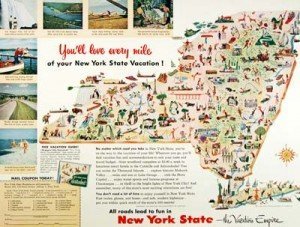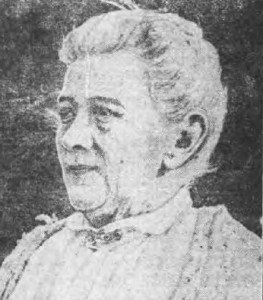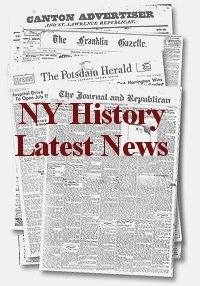- Alice Miner Museum: American Indian Objects
- Clermont: Remembering Chancellor Robert R. Livingston
- Larry Gooley: Warren Harding And The Battle of Valcour Island
- Eastman House: Erie Canal Excursion
- Uncataloged Museum: Do You Age-Stereotype? A Small Rant
- City Blog: A Jay-Z Sighting in 1939 Harlem
- Windswept Adventure: Frontier Town [Photos]
- Katz’s Deli: 125 Yrs of Change, But Pastrami’s The Same
- Schaffer Library: Gifford Pinchot Profile
- David Fitz-Enz: North Country War Zone
History
This Weeks Top New York History News
History Conferences: Neglected Tourism Revenue
 Last Saturday I attended the Native American Institute for the Hudson Valley’s conference on the Mohicans. The organization is based in Red Hook in Dutchess County. The New Netherland Museum and Replica Ship Half Moon provided support.
Last Saturday I attended the Native American Institute for the Hudson Valley’s conference on the Mohicans. The organization is based in Red Hook in Dutchess County. The New Netherland Museum and Replica Ship Half Moon provided support.
The conference included speakers, a walking tour to four sites all along Main Street, and a closing reception in a still-active colonial church. One of the speakers was from Canaan in Columbia County, and Albany, Kinderhook, Fort Ticonderoga, and New Stockbridge in Madison County figured prominently in the program. The border war between New York and Massachusetts in which the Mohicans became entangled was a constant topic.
Read more
New Online Resources For New York History
 Here’s a quick look at some of the latest New York History resources to hit the web:
Here’s a quick look at some of the latest New York History resources to hit the web:
NYPL has put an entire manuscript collection online for the first time in the library’s history. The Library’s Emmet Collection (now completely online at archives.nypl.org/
Was Mary Johnson A Civil War Veteran?
 In Lowell, Massachusetts in 1922, while working in a private home, Mrs. Mary Johnson was badly injured in a fall. At the age of 82, with few resources at her disposal, neither Mary nor her husband Peter could care for themselves. During the next two years, the couple resided in three different poorhouses, living at Fitchburg and Tewksbury before moving to the Worcester City Farm. At Fitchburg, Mrs. Johnson had begun telling stories about her secret war past, and at Worcester, folks began to take her seriously.
In Lowell, Massachusetts in 1922, while working in a private home, Mrs. Mary Johnson was badly injured in a fall. At the age of 82, with few resources at her disposal, neither Mary nor her husband Peter could care for themselves. During the next two years, the couple resided in three different poorhouses, living at Fitchburg and Tewksbury before moving to the Worcester City Farm. At Fitchburg, Mrs. Johnson had begun telling stories about her secret war past, and at Worcester, folks began to take her seriously.
According to Mary, she had served honorably in two branches of military service, most notably a stint during the Civil War. Combat was reserved for men only, but Mary openly shared the details, insisting her story was true. Read more
This Weeks New York History Web Highlights
This Weeks Top New York History News
NY Dog History: Famous Ticonderoga Canines
 In an eight-month span in the 1930s, two Ticonderoga canines made headlines for something dogs are known for in general: loyalty. Few relationships are more rewarding in life than the human-canine experience, as anyone reading this who shares a dog’s life can attest. For those who have children as well … some might be loathe to admit it, but dogs provide many of the same positives without all the complicated baggage.
In an eight-month span in the 1930s, two Ticonderoga canines made headlines for something dogs are known for in general: loyalty. Few relationships are more rewarding in life than the human-canine experience, as anyone reading this who shares a dog’s life can attest. For those who have children as well … some might be loathe to admit it, but dogs provide many of the same positives without all the complicated baggage.
Humans in dire circumstances react in two ways—save themselves or save others. We part company there with dogs, whose devotion compels them to maintain the relationship to the sweet or bitter end. Read more
Coney Island Souvenirs Throughout The Years
 In May 1654, the early settlers of Gravesend, Brooklyn purchased what is now known as Coney Island from the local Native Americans. Back then it was just a beach, but by the 1840s it had morphed into how many of us know it now: a vacation getaway right in our own city.
In May 1654, the early settlers of Gravesend, Brooklyn purchased what is now known as Coney Island from the local Native Americans. Back then it was just a beach, but by the 1840s it had morphed into how many of us know it now: a vacation getaway right in our own city.
Roads and steamships around that time made travel time from New York City around two hours, making Coney Island an accessible beach destination for anyone. By the 1920s it was even more popular, after the subway made its debut. But visitors weren’t content with just beaches and hotels. There were games to be played, rides to be ridden, and souvenirs to take home! Here are a few from the New-York Historical Society‘-s collection.
Read more
A Historical Perspective on Historical Societies
![]() Many of the posts on this New York History website highlight the programs of historical societies or raise issues about their mission, funding, and impact.
Many of the posts on this New York History website highlight the programs of historical societies or raise issues about their mission, funding, and impact.
Sometimes, a look back in our own history is useful in reminding us how enduring some of the issues are, and perhaps reminding us of strategies that have been up for discussion before. Read more
